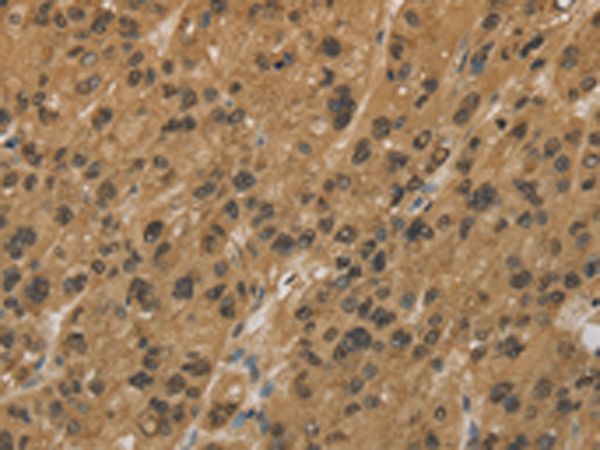


| WB | 咨询技术 | Human,Mouse,Rat |
| IF | 咨询技术 | Human,Mouse,Rat |
| IHC | 1/50-1/200 | Human,Mouse,Rat |
| ICC | 技术咨询 | Human,Mouse,Rat |
| FCM | 咨询技术 | Human,Mouse,Rat |
| Elisa | 1/2000-1/5000 | Human,Mouse,Rat |
| Aliases | RY; APG-2; HSPH2; hsp70; hsp70RY; HS24/P52 |
| WB Predicted band size | 94 kDa |
| Host/Isotype | Rabbit IgG |
| Antibody Type | Primary antibody |
| Storage | Store at 4°C short term. Aliquot and store at -20°C long term. Avoid freeze/thaw cycles. |
| Species Reactivity | Human, Mouse |
| Immunogen | Fusion protein of human HSPA4 |
| Formulation | Purified antibody in PBS with 0.05% sodium azide and 50% glycerol. |
+ +
以下是关于HSPA4抗体的3篇参考文献及其摘要概括:
1. **《HSPA4 regulates cancer stemness and metastasis in triple-negative breast cancer》**
- **作者**: Li et al. (2020)
- **摘要**: 研究通过Western blot和免疫组化实验,利用HSPA4抗体验证其在三阴性乳腺癌中的高表达,并发现其通过调控癌症干细胞特性促进肿瘤转移,提示HSPA4可能作为治疗靶点。
2. **《The role of HSPA4 in protein quality control and neurodegenerative diseases》**
- **作者**: Tanaka et al. (2018)
- **摘要**: 该研究使用HSPA4特异性抗体在小鼠模型中检测到HSPA4与错误折叠蛋白的相互作用,表明其在阿尔茨海默病等神经退行性疾病中参与蛋白质稳态调控,可能延缓病理进展。
3. **《HSPA4 as a novel biomarker for colorectal cancer prognosis》**
- **作者**: Zhang et al. (2019)
- **摘要**: 通过免疫荧光和流式细胞术分析,发现HSPA4在结直肠癌组织中显著上调,且高表达与患者不良预后相关,提示其可作为潜在的诊断标志物。
如需具体实验细节或全文,建议通过PubMed或ResearchGate等平台检索文献标题获取原文。
The HSPA4 antibody targets the heat shock protein family A (Hsp70) member 4 (HSPA4), a molecular chaperone implicated in protein folding, cellular stress response, and quality control. HSPA4. also known as APG-2 or Hsp70RY, is part of the Hsp110 subfamily, which acts as a nucleotide exchange factor for Hsp70 to regulate protein homeostasis. Unlike canonical Hsp70 proteins, HSPA4 localizes predominantly in the cytoplasm and endoplasmic reticulum, where it assists in refolding misfolded proteins, preventing aggregation, and facilitating degradation via proteasomal or autophagic pathways. Its expression is upregulated under stress conditions, such as heat shock, oxidative stress, or nutrient deprivation, to enhance cell survival.
HSPA4 antibodies are widely used in research to study its role in diseases like cancer, neurodegenerative disorders, and metabolic syndromes. Elevated HSPA4 levels are linked to tumor progression, metastasis, and chemotherapy resistance, making it a potential therapeutic target or biomarker. In neurodegenerative contexts, dysregulated HSPA4 may contribute to protein aggregation pathologies like Alzheimer’s or Parkinson’s disease. These antibodies enable detection via techniques like Western blot, immunohistochemistry, and immunofluorescence, aiding mechanistic studies. Commercial HSPA4 antibodies are typically validated for specificity against recombinant or endogenous proteins across human, mouse, and rat models. Ongoing research explores HSPA4's interplay with autophagy, apoptosis, and immune responses, highlighting its multifaceted roles in health and disease.
×